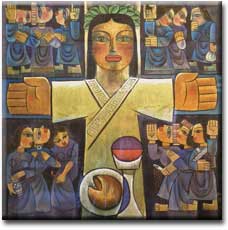| Twentieth-century
movement to promote worldwide Christian unity or cooperation. |
 |
|
|
The term "ecumenical"
stems from the Greek oikoumene, meaning "the inhabited world."
The ecumenical movement has many facets. Evangelism brings diverse
Christians into contact and cooperation in order to proclaim the gospel,
as in the crusades of Billy Graham. Youth ministry and education
have been addressed through non-denominational groups such as the YMCA,
founded in 1844. Compassion and aid to persons in need has been
especially urgent in the wake of World Wars I and II and subsequent conflicts
or natural disasters. Doctrinal differences between the Christian
traditions have been the subject of numerous dialogs. Structural union
through church mergers has taken place between groups within a denominational
family, or across denominational lines to make a national Protestant Church,
such as the United Church of Canada, the Church of South India, and the
Uniting Church of Australia. Ecumenism has many antecedents but the modern
movement began with Edinburgh 1910,
which in turn led to the World Council of Churches in 1948. Vatican
II (1962-1965) marked a new era for ecumenical relations between Roman
Catholicism and other Christian churches.
|